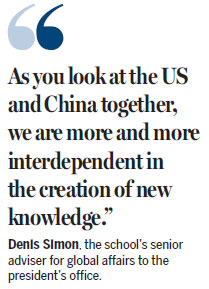Two US universities see China programs flourish
Updated: 2015-06-04 11:20
By Amy He in New York(China Daily USA)
|
||||||||
Two US state universities are increasing their China initiatives as the schools see a rise in enrollment by Chinese students.
Arizona State University, in Tempe, near Phoenix, has one of the biggest Chinese international student populations in the US, most of the growth coming in only the last five years, according to Denis Simon, the school's senior adviser for global affairs to the president's office.
The school has a number of China-related initiatives that began six to seven years ago after the university president proposed that ASU prioritize recruiting highly qualified Chinese students to the campus, setting up a series of platforms in China for joint research, and strengthening the ASU brand in China, Simon said.
"We're of the belief that innovation and technological change has now become a very global process, and as that process is globalized, almost all new knowledge is the creation of cross-border, cross-cultural, cross-functional teams," he told China Daily.
ASU now has education and research programs across China, with the two largest in Qingdao and Chengdu. In Qingdao, the school has a biology research partnership called the Bio-Design Institute, a research program in which healthcare and sustainability solutions are created by extracting designs from nature into the real world.
In Chengdu is ASU's MacroTechnology Works program, another research and development platform that applies technology to design, such as using smart technology on bridges to measure the strength of the bridge and the weight of its load to prevent structural issues from developing.
"As you look at the US and China together, we are more and more interdependent in the creation of new knowledge," Simon said. "If you look at the scientific literature, you look at the publications, you're starting to see that the US and China are working more closely together than ever before."
The school had more than 8,600 international students in the 2013-2014 school year, according to data from the Institute of International Education, and Chinese students made up more than a third of that group, at around 3,360, Simon said. About 1,700 of the Chinese students are part of the undergraduate program and 1,600 are in the graduate program.
"We went from several hundred Chinese students five years ago to a couple of thousand today," he said.
Chinese students, along with other international students and students from out of state pay about $22,000 a year in tuition, compared with the in-state tuition of $9,000, as ASU is a public state university.

The ASU brand, according to Simon, was "not well known a few years ago," but through extensive promotion on social media and a strong focus on science and technological collaboration, the school now has the fourth-largest Chinese population among US public state universities, and is in the top 10 overall of all US colleges.
Florida International University's Chaplin School of Hospitality and Tourism Management, based in Miami, is also increasing its efforts to establish partnerships in China and to bring Chinese students into the US school system.
The school has a partnership with Tianjin University of Commerce in China that was started by the Marriott Foundation, which allows students to start their degrees at a local college and then transfer into Tianjin University to finish the last two years there. Upon graduation, they receive a US degree.
Before Duke University and New York University began offering the same thing for students looking to study in China, FIU was the only US school to offer a complete bachelor's degree on-site in China, according to the hospitality school's dean Mike Hampton.
"The hospitality and tourism industry - not just in China but across Southeast Asia - is explosive," said Hampton. "There's this war (for) talent, and Marriott, because they've been one of the leaders in the growth of that sector, saw a need for development of management talent in location, because you can't import expatriates everywhere you go," Hampton said.
"Their idea was to partner with us, to be able to offer the opportunity to Chinese nationals and others to be able to get their education on-site, in the environment, so that they would then be able to get work experience, do their internships and progressively move into the industry, ready to be effective in their jobs," he said.
Students that partake in the FIU-Marriott Tianjin China Program pay about $12,000 for two years of tuition for their junior and senior years. The program currently has a 300-student cap, up from an original 150-student cap.
amyhe@chinadailyusa.com
(China Daily USA 06/04/2015 page2)

 Rescuers cut into capsized ship in search for survivors
Rescuers cut into capsized ship in search for survivors
 Search-and-rescue operation enters third day
Search-and-rescue operation enters third day
 Ten photos you don't wanna miss - June 4
Ten photos you don't wanna miss - June 4
 Djokovic ends Nadal's remarkable reign in brutal fashion
Djokovic ends Nadal's remarkable reign in brutal fashion
 Highlights of 10 years at Apple's WWDC
Highlights of 10 years at Apple's WWDC
 Rescuers fought bad weather at night
Rescuers fought bad weather at night
 Kobe Bryant causes a stir on Weibo
Kobe Bryant causes a stir on Weibo
 Ten photos you don't wanna miss - June 3
Ten photos you don't wanna miss - June 3
Most Viewed
Editor's Picks

|

|

|

|

|

|
Today's Top News
65 bodies found, more than 370 still missing
Ex-FIFA executive detailed bribes in 2013 secret guilty plea
HK economy will suffer if reform fails, tycoon says
Beijing 'shocked' at Nazi comparison by Philippines
Ship disaster in Yangtze River: Roundup of updates
Obama signs bill remaking NSA phone records program
Unconfirmed multiple bomb threats made against flights in US
Where Caitlyn Jenner found her Vanity Fair style inspiration
US Weekly

|

|